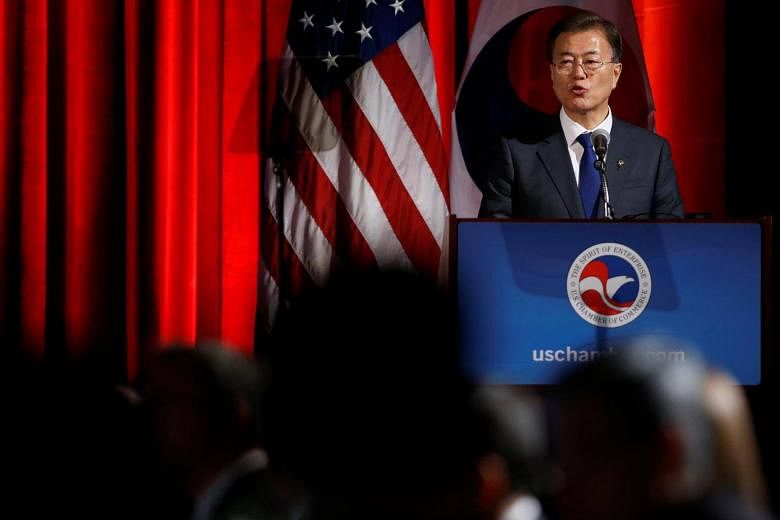WASHINGTON (Reuters, AFP) - South Korea's President Moon Jae In has arrived in Washington on his first overseas trip since taking office, for planned talks with his US counterpart Donald Trump.
Mr Moon, who backs engagement with nuclear-armed North Korea, was to meet Thursday (US time) with Mr Trump during his first foreign outing since being sworn in last month (May) after a landslide election win.
Late Wednesday, he was scheduled to take part in a wreath-laying ceremony at a war memorial in Quantico, Virginia, and later was to attend summit of Korean and American business leaders.
His agenda on Thursday includes meetings with lawmakers on Capitol Hill and an evening visit with the US president and First Lady Melania Trump, including a reception and dinner.
Washington, South Korea's security guarantor, has more than 28,000 troops in the country to defend it from its bellicose neighbour, which has been intensifying missile tests - including five since Mr Moon's inauguration.
Pyongyang is seeking to develop nuclear-capable ballistic missiles that could reach the continental United States.
Mr Trump has been pushing for tougher sanctions against Pyongyang to curb its nuclear ambitions and whose administration has said military action was a possibility. Also expected to be high on the agenda is likely to be a controversial US missile defence system that has been installed in South Korea to guard against missile threats from the North.
Though parts of the Terminal High-Altitude Area Defence (THAAD) system are already in place, Mr Moon suspended further deployment following a furious campaign of economic sanctions and diplomatic protests by Beijing against the US missile shield, dealing a blow to Washington's regional security policy. Officially, the delay is to allow for a new, comprehensive environmental impact assessment, but analysts say the move is a strategic one by Mr Moon to delay the tricky diplomatic situation he inherited.
Mr Moon is also expected to come under pressure to improve trade imbalances with the United States during meetings at the White House on Thursday and Friday.
Mr Moon did not directly address Mr Trump's concerns over the trade imbalances in a speech at the U.S. Chamber of Commerce on Wednesday evening, emphasising instead an increase in the total volume of bilateral trade.
In an interview with Reuters in April, Mr Trump called the five-year-old US-South Korean trade pact known as KORUS"horrible" and "unacceptable" and said he would either renegotiate or terminate it.
A White House official told reporters that Mr Trump would raise concerns about barriers to US auto sales and "the enormous amount of steel that sometimes ends up being surplus Chinese steel that comes to the United States via South Korea".
The official, however, predicted "a friendly and frank discussion about the trade relationship."
At the Chamber of Commerce, Mr Moon said that under his economic policy, unfair trade practices would be eradicated and factors that limited competition, such as market entry barriers and price regulations, would be "reevaluated".
He said that in spite of a 12-per-cent decrease in global trade over the last five years, bilateral trade had risen by this amount.
"The U.S. market share in Korea's import market has increased and Korea has also seen an increase in its share of the U.S. important market," he said.
"Expansion of bilateral trade is enriching the daily lives of our peoples."
Mr Moon said he hoped his visit would provide an opportunity to reaffirm the US alliance and elevate economic ties "to the next level".
"Both our countries have new governments in place; let us become best partners by creating new jobs in our countries," Mr Moon said. "Let us move forward hand in hand towards a path of joint and common prosperity."
The US goods trade deficit with South Korea has more than doubled since KORUS took effect in 2012, from US$13.2 billion in 2011 to US$27.7 billion in 2016. It was forecast to boost U.S. exports by US$10 billion a year, but they were US$3 billion lower in 2016 than in 2011.
On Tuesday, the US Chamber of Commerce said scrapping KORUS would be a rash mistake that would play into the hands of competitors. On Wednesday South Korea's Samsung Electronics said it had agreed to open a US$380 million home appliance plant in South Carolina, which is expected to generate 954 local jobs by 2020. US Commerce Secretary Wilbur Ross called the investment"great news for South Carolina and the United States".

